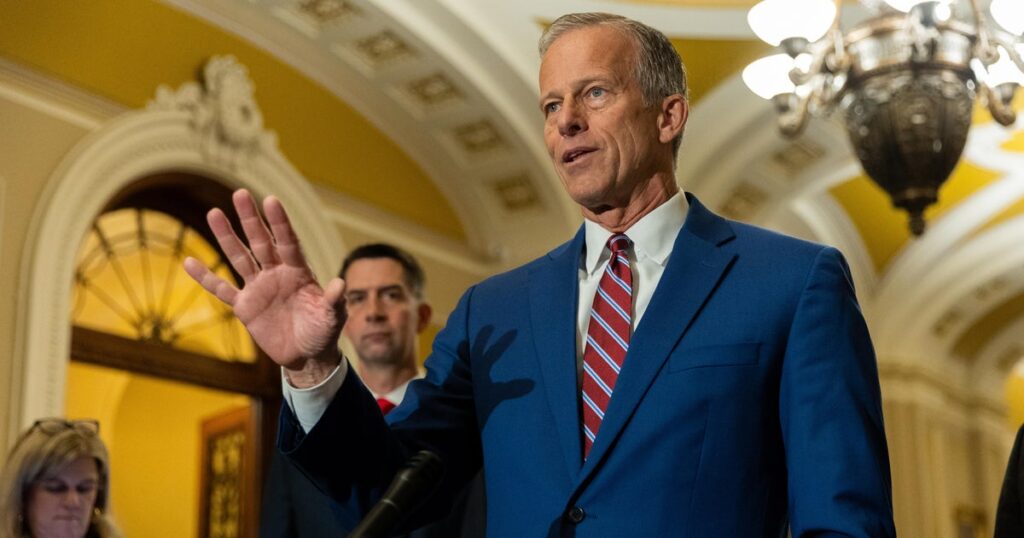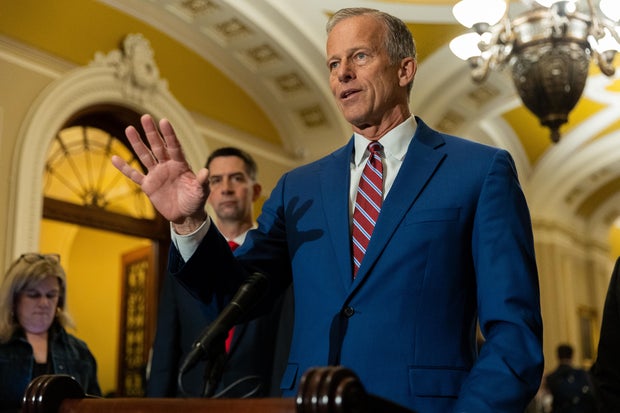Washington — The Senate advanced a crypto regulation bill on Monday night after Democratic opposition tanked an initial attempt to advance the measure earlier this month amid concern over ties between the digital asset industry and the Trump family.
The first-of-its-kind legislation, known as the GENIUS Act, would create a regulatory framework for stablecoins — a type of cryptocurrency tied to the value of an asset like the U.S. dollar. After the measure advanced out of the Senate Banking Committee with bipartisan support in March, Senate GOP leadership first brought the measure to the floor earlier this month. But the measure had lost Democratic support in the intervening weeks amid concerns about President Trump and his family’s business ventures involving cryptocurrency.
The measure moved forward in a 66-32 vote after gaining the support of some Democratic holdouts.
Monday’s vote was to limit debate on the bill, allowing the Senate to move forward to final passage.
Senate Majority Leader John Thune criticized Democrats for blocking the measure from advancing earlier this month, saying Monday, “this bill reflects the bipartisan consensus on this issue, and it’s had an open and bipartisan process since the very beginning.”
Thune, a South Dakota Republican, argued that Senate Democrats “inexplicably chose to block this legislation” earlier this month.
Nathan Posner/Anadolu via Getty Images
Since the failed vote earlier this month, negotiators returned to the table. And ahead of the procedural vote Monday, the measure saw backing from at least one Democrat as Sen. Mark Warner of Virginia advocated for the measure, calling it a “meaningful step forward,” though he added that it’s “not perfect.”
“The stablecoin market has reached nearly $250 billion and the U.S. can’t afford to keep standing on the sidelines,” Warner said in a statement. “We need clear rules of the road to protect consumers, defend national security, and support responsible innovation.”
Still, Warner pointed to concerns he said are shared among many senators about the Trump family’s “use of crypto technologies to evade oversight, hide shady financial dealings, and personally profit at the expense of everyday Americans,” after it was announced earlier this month that an Abu Dhabi-backed firm will invest billions of dollars in a Trump family-linked crypto firm, World Liberty Financial.
Warner said senators “have a duty to shine a light on these abuses,” but he argued “we cannot allow that corruption to blind us to the broader reality: blockchain technology is here to stay.”
Sen. Elizabeth Warren of Massachusetts, the top Democrat on the Senate Banking Committee, has been among the leading voices advocating for adding anti-corruption reforms to the legislation. Warren has outlined a handful of issues with the bill, saying that it puts consumers at risk and enables corruption. In a speech Monday on the Senate floor, Warren said her concerns have not been addressed and urged her colleagues to vote against the updated version.
“While a strong stablecoin bill is the best possible outcome, this weak bill is worse than no bill at all,” Warren said. “A bill that meaningfully strengthens oversight of the stablecoin market is worth enacting. A bill that turbocharges the stablecoin market, while facilitating the president’s corruption and undermining national security, financial stability, and consumer protection is worse than no bill at all.”
The measure fell short of the 60 votes necessary to move forward earlier this month, with all Senate Democrats and two Republicans — Sens. Rand Paul of Kentucky and Josh Hawley of Missouri — opposing. Paul has reservations about overregulation, while Hawley voted against the bill in part because it doesn’t prohibit big tech companies from creating their own stablecoins.
Sen. Bill Hagerty of Tennessee, who sponsored the legislation, defended the measure on CNBC’s “Squawk Box” Monday. He outlined that a lack of regulatory framework, which the bill would provide, makes for uncertainty — and results in innovative technology moving offshore. The Tennessee Republicans urged that “this will fix it,” while arguing that the bill has strong bipartisan support.
“We have broad policy agreement, Democrats and Republicans,” Hagerty said. “The question is can we get past the partisan politics and allow us to actually have a victory.”
https://www.cbsnews.com/news/senate-crypto-bill-second-try/



